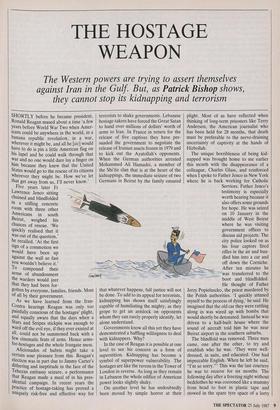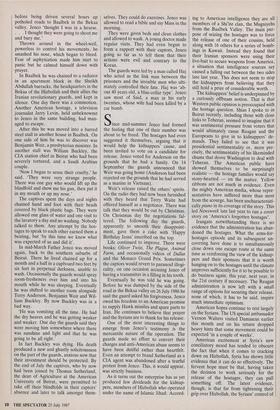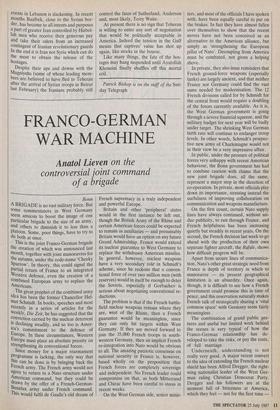THE HOSTAGE WEAPON
The Western powers are trying to assert themselves
against Iran in the Gulf. But, as Patrick Bishop shows,
they cannot stop its kidnapping and terrorism
SHORTLY before he became president, Ronald. Reagan mused about a time 'a few years before World War Two when Amer- icans could be anywhere in the world, in a banana republic revolution, in a war, wherever it might be, and all he [sic] would have to do is pin a little American flag on his lapel and he could walk through that war and no one would dare lay a finger on him because they knew that the United States would go to the rescue of its citizens wherever they might be. How we've let that get away from us, I'll never know.' Five years later Fr Lawrence Jenco sitting chained and blindfolded in a stifling concrete room with three other Americans in south Beirut, weighed his chances of rescue. 'We quickly realised that it was out of the question,' he recalled. 'At the first sign of a commotion we would have been up against the wall so fast you wouldn't believe it.' To compound their sense of abandonment the warders would jeer that they had been for- gotten by everyone, families, friends. Most of all by their government. As we have learned from the Iran- Contra hearings Reagan was only too Painfully conscious of the hostages' plight, and equally aware that the days when a Stars and Stripes stickpin was enough to ward off the evil eye, if they ever existed at all, could not be summoned back with a few cinematic feats of arms. Hence arms- for-hostages and the whole Irangate mess.
Aficionados of hubris might take a certain sour pleasure from this. Reagan's election was in part due to Jimmy Carter's dithering and ineptitude in the face of the Teheran embassy seizure, a performance that Reagan made a meal of in his pres- idential campaign. In recent years the Practice of hostage-taking has proved a uniquely risk-free and effective way for terrorists to shake governments. Lebanese hostage-takers have forced the Great Satan to hand over millions of dollars' worth of arms to Iran. In France in return for the release of five captives they have per- suaded the government to negotiate the release of Iranian assets frozen in 1979 and to kick out the Ayatollah's opponents. When the German authorities arrested Mohammed Ali Hamadei, a member of the Shi'ite clan that is at the heart of the kidnappings, the immediate seizure of two Germans in Beirut by the family ensured that whatever happens, full justice will not be done. To add to its appeal for terrorists, kidnapping has shown itself satisfyingly capable of humiliating the mighty, as they grope to get an armlock on opponents whom they can rarely properly identify, let alone understand.
Governments know all this yet they have demonstrated a baffling willingness to deal with kidnappers. Why?
In the case of Reagan it is possible at one level to see his concern as a form of superstition. Kidnapping has become a symbol of superpower vulnerability. The hostages are like the ravens in the Tower of London in reverse. As long as they remain in Lebanon the whole edifice of American power looks slightly shaky.
On another level he has undoubtedly been moved by simple horror at their plight. Most of us have reflected when thinking of long-term prisoners like Terry Anderson, the American journalist who has been held for 28 months, that death must be preferable to the nerve-draining uncertainty of captivity at the hands of Hizbollah.
The unique horribleness of being kid- napped was brought home to me earlier this month with the disappearance of a colleague, Charles Glass, and reinforced when I spoke to Father Jenco in New York where he is back working for Catholic Services. Father Jenco's testimony is especially worth hearing because it also offers some grounds for hope. He was seized The blindfold was removed. Three men came, one after the other, to try and establish who he was. 'They were well- dressed, in suits, and educated. One had impeccable English. When he left he said, "I'm so sorry."' This was the last courtesy he was to receive for six months. The following day after a freezing night without bedclothes he was cocooned like a mummy from head to foot in plastic tape and stowed in the spare tyre space of a lorry before being driven several hours up potholed roads to Baalbek in the Bekaa valley. Jenco 'thought I was in a hearse. . . I thought they were going to shoot me and bury me.'
Thrown around in the wheel-well, powerless to control his movements, he smashed his nose, which began to bleed. Fear of asphyxiation made him start to panic but he calmed himself down with prayer.
In Baalbek he was chained to a radiator in an apartment block in the Sheikh Abdullah barracks, the headquarters in the Bekaa of the Hizbollah and their allies the Iranian revolutionary guards, and kept in silence. One day there was a commotion. Another American hostage, a television journalist Jerry Levin, held unbeknownst to Jenco in the same building, had man- aged to escape.
After this he was moved into a barred steel stall in another house in Baalbek. On one side of him he was to discover was Benjamin Weir, a presbyterian minister. In another stall was William Buckley, the CIA station chief in Beirut who had been severely tortured, and a Saudi Arabian couple.
`Now I began to sense their cruelty,' he said. 'They were very strange people.
There was one guy who would lift up the blindfold and show me his gun, then put it in my mouth or up my nose.'
The captives spent the days and nights chained hand and foot with their heads covered by black plastic bags. They were allowed one glass of water and one visit to the lavatory a day and no washing. Nobody talked to them. Any attempt by the hos- tages to speak to each other earned them a beating, but `by this time we knew what was expected of us and did it'.
In mid-March Father Jenco was moved again, back to the southern suburbs of Beirut. There he lived chained up for a month and a half in a cupboard two feet by six feet in perpetual darkness, unable to wash. Occasionally the guards would spray room-fresheners over him and into his mouth while he was sleeping. Eventually he was shifted to another room alongside Terry Anderson, Benjamin Weir and Wil- liam Buckley. By now Buckley was in a bad way.
`He was vomiting all the time. He had the dry heaves and he was getting weaker and weaker. One day the guards said they were moving him somewhere where there was sunshine and light and that he was going to be all right.'
In fact Buckley was dying. His death produced a new and ghastly solicitousness on the part of the guards, anxious now that their investment should be protected. By the end of July the captives, who by now had been joined by Thomas Sutherland, the dean of Agriculture at the American University of Beirut, were permitted to take off their blindfolds in their captors' absence and later to talk amongst them- selves. They could do exercises. Jenco was allowed to read a bible and say Mass in the morning.
They were given beds and clean clothes and allowed to wash. A young doctor made regular visits. They had even begun to form a rapport with their captors, Jenco going so far as to tell them that their actions were evil and contrary to the Koran.
The guards were led by a man called Haj who acted as the link man between the prisoners and the invisible men who ulti- mately controlled their fate. Haj was 'ab- out 40 years old, a blue-collar type'. Jenco saw most of Said, a man in his early twenties, whose wife had been killed by a car bomb.
Since mid-summer Jenco had formed the feeling that one of their number was about to be freed. The hostages had even suggested it themselves, arguing that it would help the kidnappers' cause, and been invited to vote on a candidate for release. Jenco voted for Anderson on the grounds that he had a family. On 14 September the guards announced that Weir was going home (Anderson had been rejected on the grounds that he had served as a marine in Vietnam).
Weir's release raised the others' spirits. On the radio they had now been furnished with they heard that Terry Waite had offered himself as a negotiator. There was talk that they would be out by Christmas. On Christmas day the negotiations fal- tered. The following day the guards, apparently to smooth their disappoint- ment, gave them a cake with 'Happy Birthday Jesus' inscribed on the top.
Life continued to improve. There were books: Oliver Twist, The Plague, Animal Farm, and occasionally videos of Dallas and the Monaco Grand Prix. Sometimes the captors would revert to paranoid illogi- cality, on one occasion accusing Jenco of having a transmitter in a filling in his tooth.
Eventually he was told he was going. Before he was dumped by the side of the road in the Bekaa valley on 26 July 1986 he said the guard asked his forgiveness. Jenco owed his freedom to an American promise to supply Hawk missiles and spare parts to Iran. He continues to believe that prayer and the Syrians are to thank for his release.
One of the most interesting things to emerge from Jenco's testimony is the mercantile nature of the operation. The guards made no effort to convert their charges and anti-American abuse seems to have been dutiful rather than heartfelt. Even an attempt to brand Sutherland as a CIA agent was abandoned after a tearful protest from Jenco. This, it would appear, was strictly business.
As it turns out the enterprise has as yet produced few dividends for the kidnap- pers, members of Hizbollah who operated under the name of Islamic Jihad. Accord- ing to American intelligence they are all members of a Shi'ite clan, the Mugniyehs from the Baalbek Valley. The main pur- pose of seizing the hostages was to force the release of one of their cousins, held along with 16 others for a series of bomb- ings in Kuwait. Instead they found that their Iranian sponsors were using their live-bait to secure weapons from America, a situation that intelligence sources say caused a falling out between the two sides late last year. This does not seem to stop the kidnappers from believing that they still hold a prize of considerable worth.
The kidnappers' belief is underpinned by a curiously offbeam notion. That is that Western public opinion is preoccupied with the hostage question. Shias I spoke to in Beirut recently, including those with close links to Teheran, seemed to imagine that it was sentimental pressure from voters that would ultimately cause Reagan and the Europeans to give in to kidnappers' de- mands. They failed to see that it was presidential sentimentality or, more pre- cisely, the sentimentality of his likeminded chums that drove Washington to deal with Teheran. The American public have showed themselves to be surprisingly realistic — the hostage families would say stony-hearted — on the matter. Yellow ribbons are not much in evidence. Even the mighty American media, whose repre- sentatives have suffered more than most from the scourge, has been uncharacteristi- cally piano in its coverage of the story. This led Newsweek late last year to run a cover story on 'America's forgotten hostages'.
Irangate notwithstanding there is no evidence that the administration has aban- doned the hostages. What the arms-for- hostages episode and its subsequent un- covering have done is to simultaneously close down one escape route at the same time as reinforcing the view of the kidnap- pers and their sponsors that it is worth hanging on to the hostages until the climate improves sufficiently for it to be possible to do business again, this year, next year, in the 21st century if necessary. The Reagan administration is now left with a small range of options for securing their release, none of which, it has to be said, inspire much immediate optimism.
American hopes continue to rest largely on the Syrians. The US special ambassador Vernon Walters visited Damascus earlier this month and on his return dropped heavy hints that some movement could be expected 'in a couple of weeks'.
American excitement at Syria's new conciliatory mood has tended to obscure the fact that when it comes to cracking down on Hizbollah, Syria has shown little evidence that it can do so effectively. The fervent hope must be that, having taken the decision to work seriously for the release of the hostages, they can pull something off. The latest evidence, though, is that far from tightening their grip over Hizbollah, the Syrians' control of events in Lebanon is slackening. In recent months Baalbek, close to the Syrian bor- der, has become to all intents and purposes a part of greater Iran controlled by Hizbol- lah men who receive their generous pay and take their oders from an increased contingent of Iranian revolutionary guards In the end it is Iran not Syria which can do the most to obtain the release of the hostages.
Despite their ups and downs with the Mugniyehs (some of whose leading mem- bers are believed to have fled to Teheran after the arrival of Syrian troops in Beirut last February) the Iranians probably still control the fates of Sutherland, Anderson and, most likely, Terry Waite.
At present there is no sign that Teheran is willing to enter any sort of negotiation that would be politically acceptable in America. Indeed the tension in the Gulf means that captives' value has shot up again, like stocks in the bourse.
Like many things, the fate of the hos- tages may hang suspended until Ayatollah Khoneini finally shuffles off this mortal coil.
Patrick Bishop is on the staff of the Sun- day Telegraph




















































 Previous page
Previous page